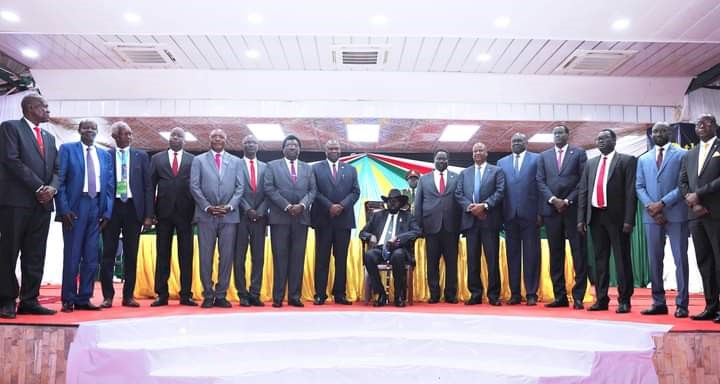By William Madouk
President Salva Kiir Mayardit emphasized the need for economic reforms as he officially opened the eighth Governors’ Forum on Tuesday.
In his remarks, President Kiir urged the governors to work together to tackle the economic challenges facing the nation.
“Honorable Governors, our country is also facing economic challenges. This will require collective efforts from both the national government and the state’s government,” said the president.
“Economic recovery is crucial for our nation’s future. You need to work on building state economies and create jobs for the youth,” he added.
The head-of-state encouraged governors to explore innovative ways to attract investment to support economic growth in their respective states, asserting the need to embark on agriculture.
“I call on all of you to prioritize agricultural initiatives and encourage partnerships between local farmers and investors. Let us collectively aim to achieve some level of food security,” he noted.
Michael Majok Agar, who is in charge of the Forum and also serves as Director-General of the Decentralization and Intergovernmental Relations in the Ministry of Presidential Affairs states presented a progress report on the 7th governors’ forum resolutions.
He cited that to improve governance coordination and sectoral development at all levels of government.
“Training programs for civil servants, localities, and members of the parliament have helped strengthen governance, structures, and financial management,” Agar noted.
In addition, he states that the revenue mobilization effort through the adoption of electronic systems and tax reform in the ten states and three administrative areas has led to a prosperous generation, enabling enhanced service delivery.
Mr Agar explained that block grants to nine ministries of the ten states and three administrative areas have supported critical sectors such as the health and education sectors.
He added that the establishment of youth centres and vocational training programs has empowered youth and provided opportunities to contribute meaningfully to their communities.
“Salary reforms, including 400% increment for civil servants, have offered temporary financial relief and improved accountability in some states,” he noted.
Weighting some of the challenges, he cited that resource constraints remain pervasive, with inadequate funding for operations, infrastructure, and timeless salary payments nationwide.
“Delayed disbursement of block and conditional grants affected critical line ministries, impairing service delivery
“Coordination gaps between national and state governments are evident, with poor communication and clear rules and national interference undermining state autonomy,” he said.
To him, Infrastructure shortages, including poor road networks, lack of office space, and insufficient equipment impede operation, particularly in rural and conflict-affected regions like Abyei and Unity.
“Environmental issues, including the impact of oil exploration, hinder agricultural development, while political interference and insecurity complicate the empowerment of the traditional authorities,” he added.
The forum is set to start yesterday, November 26, and will end on December 2, 2024, at Freedom Hall.




